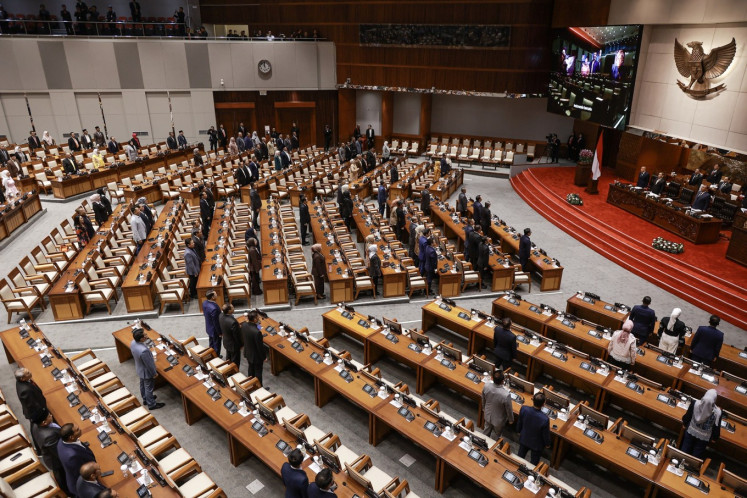Popular Reads
Top Results
Can't find what you're looking for?
View all search resultsPopular Reads
Top Results
Can't find what you're looking for?
View all search results‘Abenomics’ and implication on its Asian neighbors
Since taking office on Dec
Change text size
Gift Premium Articles
to Anyone
S
ince taking office on Dec. 26, 2012, Shinzo Abe has taken extreme action by forcing the Bank of Japan (BOJ) into more aggressive monetary easing in order to stimulate Japan’s economic growth.
This easing is being carried out through an asset-purchasing scheme and yen devaluation. In 2012, the BOJ had already expanded its balance sheet to ¥101 trillion (US$ 1.09 trillion) in order to weaken the yen.
In January, the BOJ announced a more aggressive approach through the “price stability target” and the “open-ended asset purchasing method” that will become effective in 2014. The former will be pursued by doubling the inflation target to 2 percent, whereas the latter will be carried out through unlimited asset purchasing. In order to accommodate this monetary easing, the BOJ has prepared monthly asset purchases of ¥13 trillion.
In Japan, this announcement has caused positive sentiment on the Nikkei. It hit a 33-month closing high on Friday, Feb. 1. The BOJ’s commitment to pursuing more monetary easing also weakened the yen further. On the same day, the yen also hit a 32-month low of 92.2 against the US dollar.
Following this sharp depreciation, some economists are worried that this action may lead to a currency war. Moreover, some countries such as Australia, the United States and Germany are concerned that the weaker yen may have a negative impact on their economies.
Nevertheless, for the rest of Asia, particularly East Asian economies, yen depreciation does not necessarily lead to bad things.
In fact, the manufacturing sector in the region may benefit from a cheaper yen since most Southeast Asian economies such as Thailand, Malaysia and Indonesia import manufacturing parts and components from Japan. These parts are then assembled and sold in the local market.
As a consequence, a weaker yen causes the import price to drop and, thus, local companies will be able to enjoy higher profit margins due to lower production costs and, to some extent, less severe foreign exchange losses from trading with Japanese companies.
In the recent years, the strengthening yen, which led to higher production costs, adversely affected the manufacturing sector in Indonesia, particularly the automotive industry. Therefore, the change in direction of the yen should be considered as momentum to enhance manufacturing in Indonesia since it provides an incentive to produce more goods while production costs reduce.
Despite these benefits, a weakening yen may also have some negative implications. One possible short-term adverse impact of a weaker yen is Japan’s declining purchasing power in Asia.
Currently, Japan is a major investor in the region, it invests heavily in its Asian neighbors. In Indonesia, for instance, Japan is one of the biggest investors and only second to Singapore in 2012. A report by CIMB Research shows that Japan’s foreign direct investment (FDI) accounts for around 11 percent of Indonesia’s total inward FDI.
Hence, as the yen depreciates, Japan’s investment in Indonesia and other Asian countries will slow down in the short-run due to more expensive outward capital investment. Considering Japan’s big FDI influence, this slower investment from Japan, to some extent, will hinder investment growth in the region.
Another possible negative impact is the expected decline in exports from Asian countries to Japan. As the yen gets weaker, Japan’s consumers will buy fewer foreign goods as they become more expensive. Thus, Japan will import less from other countries, including Indonesia.
In this regard, data from the CEIC suggest that Indonesia’s export share to Japan is around 16 percent of its total exports. Thus, Indonesia’s reliance on exports to the Japanese market may result in a weakened trade balance.
Meanwhile, Indonesia has been experiencing a trade deficit since the fourth quarter of 2012 and, based on the government forecasts, will see another deficit in 2013.
As a consequence, Indonesia’s government has to be careful in order to prevent its trade balance deteriorating further, following the weaker yen.
In short, however, the depreciating yen will have a positive impact on Asian economies, including Indonesia. In particular, this will bring benefits to the manufacturing sector that imports parts from Japan.
Nevertheless, Indonesia’s government and central bank has to monitor its impacts closely since it may also have negative results.
The writer is a graduate of the University of Manchester, UK.










